大学英语第三册UNIT3全文翻译对照
新视野大学英语第三版第三册Unit3课文+翻译
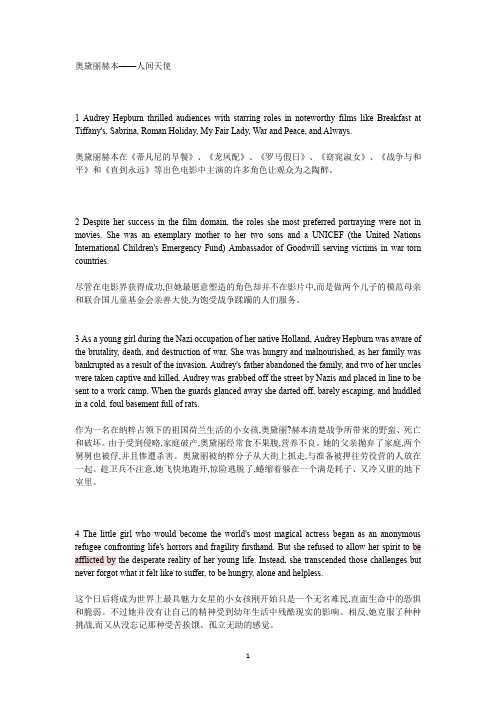
奥黛丽赫本——人间天使1 Audrey Hepburn thrilled audiences with starring roles in noteworthy films like Breakfast at Tiffany's, Sabrina, Roman Holiday, My Fair Lady, War and Peace, and Always.奥黛丽赫本在《蒂凡尼的早餐》、《龙凤配》、《罗马假日》、《窈窕淑女》、《战争与和平》和《直到永远》等出色电影中主演的许多角色让观众为之陶醉。
2 Despite her success in the film domain, the roles she most preferred portraying were not in movies. She was an exemplary mother to her two sons and a UNICEF (the United Nations International Children's Emergency Fund) Ambassador of Goodwill serving victims in war-torn countries.尽管在电影界获得成功,但她最愿意塑造的角色却并不在影片中,而是做两个儿子的模范母亲和联合国儿童基金会亲善大使,为饱受战争蹂躏的人们服务。
3 As a young girl during the Nazi occupation of her native Holland, Audrey Hepburn was aware of the brutality, death, and destruction of war. She was hungry and malnourished, as her family was bankrupted as a result of the invasion. Audrey's father abandoned the family, and two of her uncles were taken captive and killed. Audrey was grabbed off the street by Nazis and placed in line to be sent to a work camp. When the guards glanced away she darted off, barely escaping, and huddled in a cold, foul basement full of rats.作为一名在纳粹占领下的祖国荷兰生活的小女孩,奥黛丽?赫本清楚战争所带来的野蛮、死亡和破坏。
新视野大学英语第三版读写教程第三册UNIT3课文及翻译(A+B篇)
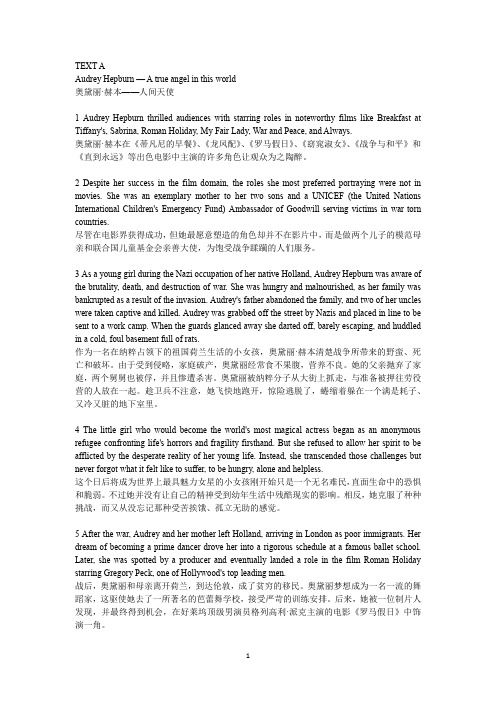
TEXT AAudrey Hepburn — A true angel in this world奥黛丽·赫本——人间天使1 Audrey Hepburn thrilled audiences with starring roles in noteworthy films like Breakfast at Tiffany's, Sabrina, Roman Holiday, My Fair Lady, War and Peace, and Always.奥黛丽·赫本在《蒂凡尼的早餐》、《龙凤配》、《罗马假日》、《窈窕淑女》、《战争与和平》和《直到永远》等出色电影中主演的许多角色让观众为之陶醉。
2 Despite her success in the film domain, the roles she most preferred portraying were not in movies. She was an exemplary mother to her two sons and a UNICEF (the United Nations International Children's Emergency Fund) Ambassador of Goodwill serving victims in war-torn countries.尽管在电影界获得成功,但她最愿意塑造的角色却并不在影片中,而是做两个儿子的模范母亲和联合国儿童基金会亲善大使,为饱受战争蹂躏的人们服务。
3 As a young girl during the Nazi occupation of her native Holland, Audrey Hepburn was aware of the brutality, death, and destruction of war. She was hungry and malnourished, as her family was bankrupted as a result of the invasion. Audrey's father abandoned the family, and two of her uncles were taken captive and killed. Audrey was grabbed off the street by Nazis and placed in line to be sent to a work camp. When the guards glanced away she darted off, barely escaping, and huddled in a cold, foul basement full of rats.作为一名在纳粹占领下的祖国荷兰生活的小女孩,奥黛丽·赫本清楚战争所带来的野蛮、死亡和破坏。
全新版大学英语综合教程3课文unit1~3翻译

unit 1 Mr. Doherty Builds His Dream LifeMr. Doherty Builds His Dream LifeJim Doherty1.There are two things I have always wanted to do -- write and live on a farm. Today I'm doing both. I am not in E. B. White's class as a writer or in my neighbors' league as a farmer, but I'm getting by. And after years of frustration with city and suburban living, my wife Sandy and I have finally found contentment here in the country多尔蒂先生创建自己的理想生活吉姆·多尔蒂有两件事是我一直想做的――写作与务农。
如今我同时做着这两件事。
作为作家,我和E·B·怀特不属同一等级,作为农场主,我和乡邻也不是同一类人,不过我应付得还行。
在城市以及郊区历经多年的怅惘失望之后,我和妻子桑迪终于在这里的乡村寻觅到心灵的满足。
2 .It's a self-reliant sort of life. We grow nearly all of our fruits and vegetables. Our hens keep us in eggs, with several dozen left over to sell each week. Our bees provide us with honey, and we cut enough wood to just about make it through the heating season.这是一种自力更生的生活。
新视野大学英语第三版读写教程第三册UNIT3课文及翻译(A+B篇)

TEXT AAudrey Hepburn — A true angel in this world奥黛丽·赫本——人间天使1 Audrey Hepburn thrilled audiences with starring roles in noteworthy films like Breakfast at Tiffany's, Sabrina, Roman Holiday, My Fair Lady, War and Peace, and Always.奥黛丽·赫本在《蒂凡尼的早餐》、《龙凤配》、《罗马假日》、《窈窕淑女》、《战争与和平》和《直到永远》等出色电影中主演的许多角色让观众为之陶醉。
2 Despite her success in the film domain, the roles she most preferred portraying were not in movies. She was an exemplary mother to her two sons and a UNICEF (the United Nations International Children's Emergency Fund) Ambassador of Goodwill serving victims in war-torn countries.尽管在电影界获得成功,但她最愿意塑造的角色却并不在影片中,而是做两个儿子的模范母亲和联合国儿童基金会亲善大使,为饱受战争蹂躏的人们服务。
3 As a young girl during the Nazi occupation of her native Holland, Audrey Hepburn was aware of the brutality, death, and destruction of war. She was hungry and malnourished, as her family was bankrupted as a result of the invasion. Audrey's father abandoned the family, and two of her uncles were taken captive and killed. Audrey was grabbed off the street by Nazis and placed in line to be sent to a work camp. When the guards glanced away she darted off, barely escaping, and huddled in a cold, foul basement full of rats.作为一名在纳粹占领下的祖国荷兰生活的小女孩,奥黛丽·赫本清楚战争所带来的野蛮、死亡和破坏。
新标准大学英语综合教程3课文翻译和课后习题答案 Unit 3
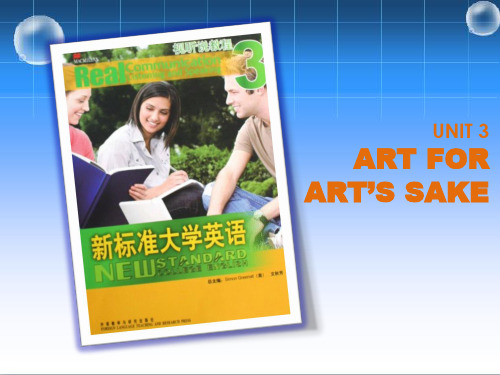
capacities. But, for the sake of analysis, the whole
listening process may become clearer if we break it
up into its component parts, so to speak. In a certain
Text
Did not Stravinsky himself proclaim that his music was an "object", a "thing", with a life of its own, and with no other meaning than its own purely musical existence? This intransigent attitude of Stravinsky's may be due to the fact that so many people have tried to read different meanings into so many pieces. Heaven knows it is difficult enough to say precisely what it is that a piece of music means, to say it definitely, to say it finally so that everyone is satisfied with your explanation. But that should not lead one to the other extreme of denying to music the right to be "expressive".
新视野大学英语3第三版课文翻译

新视野大学英语3第三版课文翻译Unit 1 The Way to Success课文ANever, ever give up!永不言弃!As a young boy, Britain's great Prime Minister, Sir Winston Churchill, attended a public school called Harrow. He was not a good student, and had he not been from a famous family, he probably would have been removed from the school for deviating from the rules. Thankfully, he did finish at Harrow and his errors there did not preclude him from going on to the university. He eventually had a premier army career whereby he was later elected prime minister. He achieved fame for his wit, wisdom, civic duty, and abundant courage in his refusal to surrender during the miserable dark days of World War II. His amazing determination helped motivate his entire nation and was an inspiration worldwide.Toward the end of his period as prime minister, he was invited to address the patriotic young boys at his old school, Harrow. The headmaster said, "Young gentlemen, the greatest speaker of our time, will be here in a few days to address you, and you should obey whatever sound advice he may give you." The great day arrived. Sir Winston stood up, all five feet, five inches and 107 kilos of him, and gave this short, clear-cut speech: "Young men, never give up. Never give up! Never give up! Never, never, never, never!"英国的伟大首相温斯顿·丘吉尔爵士,小时候在哈罗公学上学。
新视界大学英语综合教程第三册Unit3Activereading课文及翻译
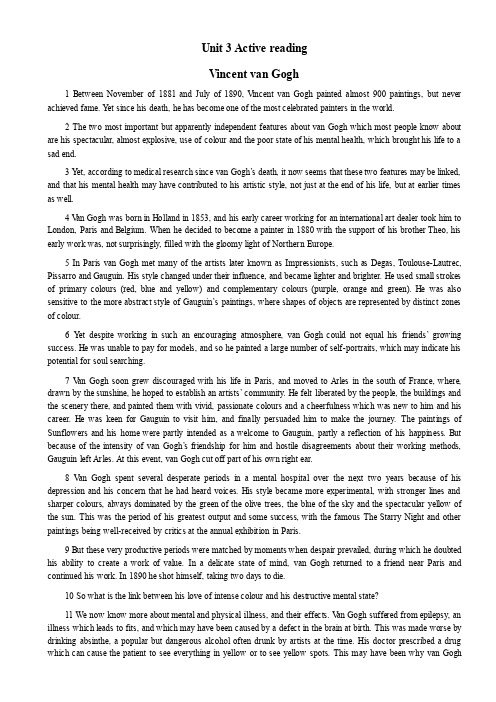
Unit 3 Active readingVincent van Gogh1 Between November of 1881 and July of 1890, V incent van Gogh painted almost 900 paintings, but never achieved fame. Y et since his death, he has become one of the most celebrated painters in the world.2 The two most important but apparently independent features about van Gogh which most people know about are his spectacular, almost explosive, use of colour and the poor state of his mental health, which brought his life to a sad end.3 Y et, according to medical resear ch since van Gogh’s death, it now seems that these two features may be linked, and that his mental health may have contributed to his artistic style, not just at the end of his life, but at earlier times as well.4 V an Gogh was born in Holland in 1853, and his early career working for an international art dealer took him to London, Paris and Belgium. When he decided to become a painter in 1880 with the support of his brother Theo, his early work was, not surprisingly, filled with the gloomy light of Northern Europe.5 In Paris van Gogh met many of the artists later known as Impressionists, such as Degas, Toulouse-Lautrec, Pissarro and Gauguin. His style changed under their influence, and became lighter and brighter. He used small strokes of primary colours (red, blue and yellow) and complementary colours (purple, orange and green). He was also sensitive to the more abstract style of Gauguin’s paintings, where shapes of objects are represented by distinct zones of colour.6 Y et despite working in such an enco uraging atmosphere, van Gogh could not equal his friends’ growing success. He was unable to pay for models, and so he painted a large number of self-portraits, which may indicate his potential for soul searching.7 V an Gogh soon grew discouraged with his life in Paris, and moved to Arles in the south of France, where, drawn by the sunshine, he hoped to establish an artists’ community. He felt liberated by the people, the buildings and the scenery there, and painted them with vivid, passionate colours and a cheerfulness which was new to him and his career. He was keen for Gauguin to visit him, and finally persuaded him to make the journey. The paintings of Sunflowers and his home were partly intended as a welcome to Gauguin, partly a reflection of his happiness. But because of the intensity of van Gogh’s friendship for him and hostile disagreements about their working methods, Gauguin left Arles. At this event, van Gogh cut off part of his own right ear.8 V an Gogh spent several desperate periods in a mental hospital over the next two years because of his depression and his concern that he had heard voices. His style became more experimental, with stronger lines and sharper colours, always dominated by the green of the olive trees, the blue of the sky and the spectacular yellow of the sun. This was the period of his greatest output and some success, with the famous The Starry Night and other paintings being well-received by critics at the annual exhibition in Paris.9 But these very productive periods were matched by moments when despair prevailed, during which he doubted his ability to create a work of value. In a delicate state of mind, van Gogh returned to a friend near Paris and continued his work. In 1890 he shot himself, taking two days to die.10 So what is the link between his love of intense colour and his destructive mental state?11 We now know more about mental and physical illness, and their effects. V an Gogh suffered from epilepsy, an illness which leads to fits, and which may have been caused by a defect in the brain at birth. This was made worse by drinking absinthe, a popular but dangerous alcohol often drunk by artists at the time. His doctor prescribed a drug which can cause the patient to see everything in yellow or to see yellow spots. This may have been why van Goghloved the colour.12 V an Gogh experienced a surge of activity, after which he became tired and depressed. We now recognize these to be symptoms of bipolar disorder. He also used lead-based paints, exposure to which can lead to lead poisoning. One of the symptoms of lead poisoning is a swelling of the retinas in the eyes, which can cause one to see light in circles around objects. We can see this effect in paintings such as The Starry Night.13 Another condition linked to epilepsy and manic behaviour is the spontaneous need to write continuously. V an Gogh wrote over 800 letters to his brother, Theo, which might be the result of this condition.14 V an Gogh wanted his paintings to be realistic, so he worked outdoors. Some of the episodes of aggressiveness and feeling sick may be the effects of sunstroke.15 Finally, hearing voices is a well-established symptom of schizophrenia, a serious mental illness which changes the relationship between what you think and reality.16 We talk about the genius necessary to produce great works of art. In van Gogh’s case, his genius, especially in his use of colour, may be due to his mental health. As art lovers, we acknowledge that van Gogh produced some of the greatest paintings the world has ever known, and gave inspiration to so many later artists. But we should not overlook the mental torture he suffered for his art.文森特·凡·高1 在1881年11月至1890年7月之间,文森特·凡·高大约画了900幅画,却没有成名。
大学英语精读3课文翻译全

Unit 1 A Brush with the Law一个青年发现,在大街上毫无明显目的地游逛会招致警方的责罚。
误会一个接一个发生,最终他只得出庭受审……与警察的一场小冲突我平生只有一次跟警方发生纠葛。
被捕和出庭的整个过程在当时是一件非常不愉快的事,但现在倒成了一篇很好的故事。
这次经历令人可恼之处在于围绕着我的被捕以及随后庭上审讯而出现的种种武断专横的情况。
事情发生在大约12年前,其时正是2月。
几个月前我中学毕业了,但上大学要等到10月。
当时我还在家中居住。
一天早晨,我来到里士满。
这里是伦敦的一个郊区,离我住的地方不远。
我在寻找一份临时工作,以便积些钱去旅游。
由于天气晴朗,当时又无急事,我便慢悠悠看看橱窗,逛逛公园。
有时干脆停下脚步,四处张望。
现在看来,一定是这种明显的毫无目的的游逛,使我倒了霉。
事情发生在11点半钟光景。
我在当地图书馆谋职未成,刚刚走出来,便看到一个人穿越马路,显然是要来跟我说话。
我以为他要问我时间,不料他说他是警官,要逮捕我。
起先我还以为这是在开玩笑,但又一个警察出现在我的面前,这次是位身着警服的,这一下使我确信无疑了。
“为什么要抓我?”我问道。
“到处游荡,企图作案,”他说。
“作什么案?”我又问。
“偷窃,”他说。
“偷什么?”我追问。
“牛奶瓶,”他板着面孔说道。
“噢,”我说。
事情原来是这样的,在这一地区多次发生小的扒窃案,特别是从门前台阶上偷走牛奶瓶。
接着,我犯了一个大错误。
其时我年方19,留一头蓬乱的长发,自认为是60年代“青年反主流文化”的一员。
所以我想装出一副冷漠的、对这一事件满不在乎的样子。
于是我尽量用一种漫不经心的极其随便的腔调说,“你们跟踪我多久啦?”这样一来,在他们眼里,我就像是非常熟悉这一套的了,也使他们更加确信我是一个地地道道的坏蛋。
几分钟后,开来了一辆警车。
“坐到后面去,”他们说。
“把手放到前排座位的靠背上,不准挪动。
”他们分别坐在我的两边。
这可再也不是闹着玩的了。
新标准大学英语综合教程3 unit3 课文翻译
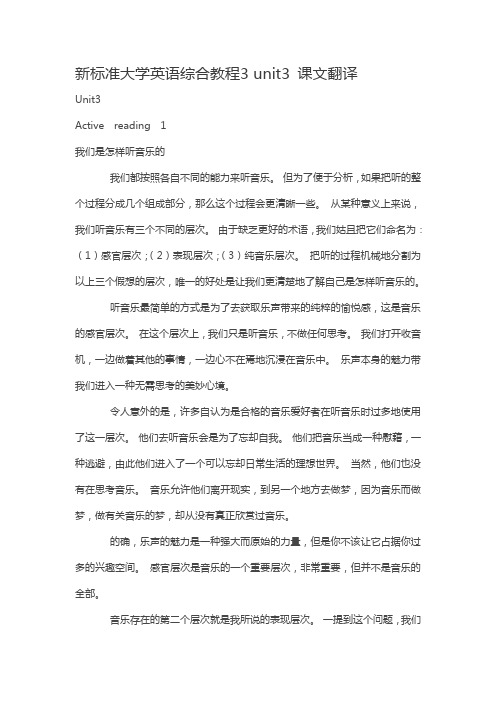
新标准大学英语综合教程3 unit3 课文翻译Unit3Active reading 1我们是怎样听音乐的我们都按照各自不同的能力来听音乐。
但为了便于分析,如果把听的整个过程分成几个组成部分,那么这个过程会更清晰一些。
从某种意义上来说,我们听音乐有三个不同的层次。
由于缺乏更好的术语,我们姑且把它们命名为:(1)感官层次;(2)表现层次;(3)纯音乐层次。
把听的过程机械地分割为以上三个假想的层次,唯一的好处是让我们更清楚地了解自己是怎样听音乐的。
听音乐最简单的方式是为了去获取乐声带来的纯粹的愉悦感,这是音乐的感官层次。
在这个层次上,我们只是听音乐,不做任何思考。
我们打开收音机,一边做着其他的事情,一边心不在焉地沉浸在音乐中。
乐声本身的魅力带我们进入一种无需思考的美妙心境。
令人意外的是,许多自认为是合格的音乐爱好者在听音乐时过多地使用了这一层次。
他们去听音乐会是为了忘却自我。
他们把音乐当成一种慰藉,一种逃避,由此他们进入了一个可以忘却日常生活的理想世界。
当然,他们也没有在思考音乐。
音乐允许他们离开现实,到另一个地方去做梦,因为音乐而做梦,做有关音乐的梦,却从没有真正欣赏过音乐。
的确,乐声的魅力是一种强大而原始的力量,但是你不该让它占据你过多的兴趣空间。
感官层次是音乐的一个重要层次,非常重要,但并不是音乐的全部。
音乐存在的第二个层次就是我所说的表现层次。
一提到这个问题,我们马上就进入到一个颇具争议的领域。
作曲家总是设法避开有关音乐表现方面的讨论。
斯特拉温斯基不是曾经声称他的音乐是一个“物体”,是一件有自我生命的“东西”,除了纯音乐性的存在之外没有任何别的含意吗?斯特拉温斯基这种不妥协的态度可能源于这样的一个事实:有那么多的人尝试着从众多的音乐作品中读出完全不同的含意。
确实,要准确地说出一部音乐作品的含意已经很难了,要肯定并确定地说出来,还要使每个人对你的解释都感到满意,是难上加难。
但我们不该因此走到另一个极端,不能去剥夺音乐“表现”的权利。
新视野大学英语第三册Unit3课文翻译

新视野大学英语第三册Unit3课文翻译新视野大学英语第三册Unit 3课文翻译“Where Principles Come First”是新视野大学英语读写教程第三册Unit 3的主题,下面是店铺整理的课文翻译,欢迎阅读!新视野大学英语第三册Unit 3课文翻译【1】海德中学的办学宗旨是:如果你向学生传授诸如求真、勇敢、正直、领导能力、好奇心和关心他人等美德的话,学生的学习成绩自然就会提高。
该校的创始人约瑟夫·高尔德声称学校的教学很成功。
海德中学位于缅因州巴思市,每年的学费高达1.8万美元,因其教导问题少年有方而闻名遐迩。
“我们并不把自己看作一所专为某一类孩子而开设的学校,”马尔科姆·高尔德说。
他是约瑟夫的儿子,毕业于海德中学,现任海德中学校长。
“我们把帮助孩子培养一种生活方式看作自己的职责,办法是倡导一整套能影响所有孩子的价值观念。
”现在,乔·高尔德(约瑟夫·高尔德)正试图将他尚有争议的“品德第一”的理念向旧城区的公立学校推广。
这些学校愿意将用于传统教学计划的税金用于实施这一新的教学方法。
海德公立学校第一个教学计划始于1992年9月。
但几个月后,该计划即告暂停。
教师们对教学计划的高要求以及高强度工作所带来的压力表示抗议。
今年秋天,海德基金会计划在巴尔的摩启动初步的公立学校教学计划。
教师要接受培训,以便今后能在整个巴尔的摩体系内胜任工作。
美国其他学校的领导们也在关注这个教学计划。
去年秋天,在家长的一片抗议声中,海德基金会在康涅狄格州纽黑文市郊区的一所中学内启动了一个引人注目的教学计划。
当地居民担心该校可能招进来旧城区的少数民族学生和问题学生。
就像在缅因州那样,求真也在康涅狄格州的这所中学得到广泛推崇。
在一堂英语课上,11名学生用最后的5分钟展开激烈的讨论,依照1-10的评分标准相互评价他们当天的课堂表现。
“我得10分。
”“我有意见。
你既没做语法作业,也没做拼写练习。
大学英语精读第三版第三册unit1-unit3课文翻译
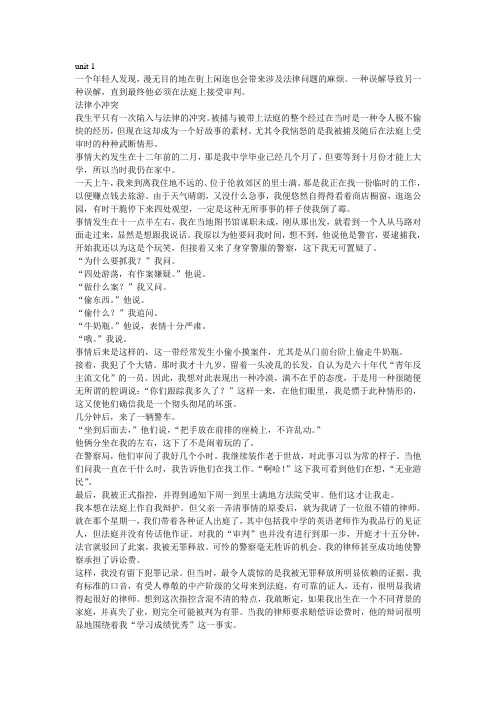
unit 1一个年轻人发现,漫无目的地在街上闲逛也会带来涉及法律问题的麻烦。
一种误解导致另一种误解,直到最终他必须在法庭上接受审判。
法律小冲突我生平只有一次陷入与法律的冲突。
被捕与被带上法庭的整个经过在当时是一种令人极不愉快的经历,但现在这却成为一个好故事的素材。
尤其令我恼怒的是我被捕及随后在法庭上受审时的种种武断情形。
事情大约发生在十二年前的二月,那是我中学毕业已经几个月了,但要等到十月份才能上大学,所以当时我仍在家中。
一天上午,我来到离我住地不远的、位于伦敦郊区的里士满。
那是我正在找一份临时的工作,以便赚点钱去旅游。
由于天气晴朗,又没什么急事,我便悠然自得得看着商店橱窗,逛逛公园,有时干脆停下来四处观望,一定是这种无所事事的样子使我倒了霉。
事情发生在十一点半左右,我在当地图书馆谋职未成,刚从那出发,就看到一个人从马路对面走过来,显然是想跟我说话。
我原以为他要问我时间,想不到,他说他是警官,要逮捕我,开始我还以为这是个玩笑,但接着又来了身穿警服的警察,这下我无可置疑了。
“为什么要抓我?”我问。
“四处游荡,有作案嫌疑。
”他说。
“做什么案?”我又问。
“偷东西。
”他说。
“偷什么?”我追问。
“牛奶瓶。
”他说,表情十分严肃。
“哦。
”我说。
事情后来是这样的,这一带经常发生小偷小摸案件,尤其是从门前台阶上偷走牛奶瓶。
接着,我犯了个大错。
那时我才十九岁,留着一头凌乱的长发,自认为是六十年代“青年反主流文化”的一员。
因此,我想对此表现出一种冷漠,满不在乎的态度,于是用一种很随便无所谓的腔调说:“你们跟踪我多久了?”这样一来,在他们眼里,我是惯于此种情形的,这又使他们确信我是一个彻头彻尾的坏蛋。
几分钟后,来了一辆警车。
“坐到后面去,”他们说,“把手放在前排的座椅上,不许乱动。
”他俩分坐在我的左右,这下了不是闹着玩的了。
在警察局,他们审问了我好几个小时。
我继续装作老于世故,对此事习以为常的样子。
当他们问我一直在干什么时,我告诉他们在找工作。
大学英语第三册UNIT3全文翻译对照

大学英语第三册UNIT3全文翻译对照The land of the lock1. Years ago in American, it was customary for families to leave their doors unlocked, day and night. In this essay, Greene regrets that people can no longer trust each other and have to resort to elaborate security system to protect themselves and their valuables.Although the author is writing his opinion, he uses many examples to reinforce his ideas and to prove his thesis.几年前在美国,许多美国家庭的门通常都是日夜不上锁的。
在本文中,格林遗憾地指出人们已经不再彼此信任,不得不求助于各种复杂的安全设备来保护自身及其贵重物品。
作者在提出自己观点的同时,举出了大量的事例来证实和强调自己的观点;2. In the house where i grow up, it was our custom to leave the front door on the latch at night. I don't know if that was a local term or if is universal;"on the latch"meant the door was closed but not locked . None of us carried keys the last one in for the evening would close up,and that was it. 在我长大成人的家里,我们的习惯是晚上把前门闩上。
新编大学英语3 第三单元课文翻译
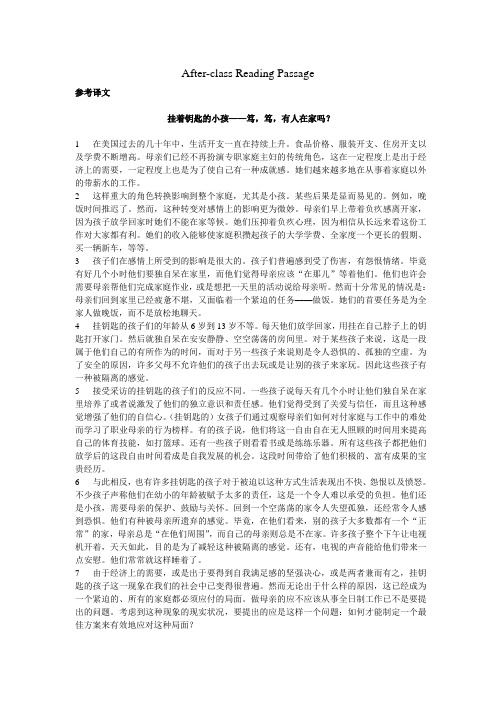
After-class Reading Passage参考译文挂着钥匙的小孩––––笃,笃,有人在家吗?1 在美国过去的几十年中,生活开支一直在持续上升。
食品价格、服装开支、住房开支以及学费不断增高。
母亲们已经不再扮演专职家庭主妇的传统角色,这在一定程度上是出于经济上的需要,一定程度上也是为了使自己有一种成就感。
她们越来越多地在从事着家庭以外的带薪水的工作。
2 这样重大的角色转换影响到整个家庭,尤其是小孩。
某些后果是显而易见的。
例如,晚饭时间推迟了。
然而,这种转变对感情上的影响更为微妙。
母亲们早上带着负疚感离开家,因为孩子放学回家时她们不能在家等候。
她们压抑着负疚心理,因为相信从长远来看这份工作对大家都有利。
她们的收入能够使家庭积攒起孩子的大学学费、全家度一个更长的假期、买一辆新车,等等。
3 孩子们在感情上所受到的影响是很大的。
孩子们普遍感到受了伤害,有怨恨情绪。
毕竟有好几个小时他们要独自呆在家里,而他们觉得母亲应该“在那儿”等着他们。
他们也许会需要母亲帮他们完成家庭作业,或是想把一天里的活动说给母亲听。
然而十分常见的情况是:母亲们回到家里已经疲惫不堪,又面临着一个紧迫的任务––––做饭。
她们的首要任务是为全家人做晚饭,而不是放松地聊天。
4 挂钥匙的孩子们的年龄从6岁到13岁不等。
每天他们放学回家,用挂在自己脖子上的钥匙打开家门。
然后就独自呆在安安静静、空空荡荡的房间里。
对于某些孩子来说,这是一段属于他们自己的有所作为的时间,而对于另一些孩子来说则是令人恐惧的、孤独的空虚。
为了安全的原因,许多父母不允许他们的孩子出去玩或是让别的孩子来家玩。
因此这些孩子有一种被隔离的感觉。
5 接受采访的挂钥匙的孩子们的反应不同。
一些孩子说每天有几个小时让他们独自呆在家里培养了或者说激发了他们的独立意识和责任感。
他们觉得受到了关爱与信任,而且这种感觉增强了他们的自信心。
(挂钥匙的)女孩子们通过观察母亲们如何对付家庭与工作中的难处而学习了职业母亲的行为榜样。
新视野大学英语第三版读写教程第三册UNIT3课文及翻译(A+B篇)

TEXT AAudrey Hepburn — A true angel in this world奥黛丽·赫本——人间天使1 Audrey Hepburn thrilled audiences with starring roles in noteworthy films like Breakfast at Tiffany's, Sabrina, Roman Holiday, My Fair Lady, War and Peace, and Always.奥黛丽·赫本在《蒂凡尼的早餐》、《龙凤配》、《罗马假日》、《窈窕淑女》、《战争与和平》和《直到永远》等出色电影中主演的许多角色让观众为之陶醉。
2 Despite her success in the film domain, the roles she most preferred portraying were not in movies. She was an exemplary mother to her two sons and a UNICEF (the United Nations International Children's Emergency Fund) Ambassador of Goodwill serving victims in war-torn countries.尽管在电影界获得成功,但她最愿意塑造的角色却并不在影片中,而是做两个儿子的模范母亲和联合国儿童基金会亲善大使,为饱受战争蹂躏的人们服务。
3 As a young girl during the Nazi occupation of her native Holland, Audrey Hepburn was aware of the brutality, death, and destruction of war. She was hungry and malnourished, as her family was bankrupted as a result of the invasion. Audrey's father abandoned the family, and two of her uncles were taken captive and killed. Audrey was grabbed off the street by Nazis and placed in line to be sent to a work camp. When the guards glanced away she darted off, barely escaping, and huddled in a cold, foul basement full of rats.作为一名在纳粹占领下的祖国荷兰生活的小女孩,奥黛丽·赫本清楚战争所带来的野蛮、死亡和破坏。
新视野大学英语第三版读写教程第三册UNIT3课文及翻译(A+B篇)

TEXT AAudrey Hepburn — A true angel in this world奥黛丽·赫本——人间天使1 Audrey Hepburn thrilled audiences with starring roles in noteworthy films like Breakfast at Tiffany's, Sabrina, Roman Holiday, My Fair Lady, War and Peace, and Always.奥黛丽·赫本在《蒂凡尼的早餐》、《龙凤配》、《罗马假日》、《窈窕淑女》、《战争与和平》和《直到永远》等出色电影中主演的许多角色让观众为之陶醉。
2 Despite her success in the film domain, the roles she most preferred portraying were not in movies. She was an exemplary mother to her two sons and a UNICEF (the United Nations International Children's Emergency Fund) Ambassador of Goodwill serving victims in war-torn countries.尽管在电影界获得成功,但她最愿意塑造的角色却并不在影片中,而是做两个儿子的模范母亲和联合国儿童基金会亲善大使,为饱受战争蹂躏的人们服务。
3 As a young girl during the Nazi occupation of her native Holland, Audrey Hepburn was aware of the brutality, death, and destruction of war. She was hungry and malnourished, as her family was bankrupted as a result of the invasion. Audrey's father abandoned the family, and two of her uncles were taken captive and killed. Audrey was grabbed off the street by Nazis and placed in line to be sent to a work camp. When the guards glanced away she darted off, barely escaping, and huddled in a cold, foul basement full of rats.作为一名在纳粹占领下的祖国荷兰生活的小女孩,奥黛丽·赫本清楚战争所带来的野蛮、死亡和破坏。
大学英语三-Unit-3-Why-I-Teach课文及翻译

大学英语三-Unit-3-Why-I-Teach课文及翻译Unit 3 Why I TeachPeter G. BeidlerEvery teacher probably asks himself time and again: What are the reasons for choosing teaching as a career? Do the rewards teaching outweigh the trying comments? Answering these questions is not a simple task. Let's see what the author says.Why do you teach? My friend asked the question when I told him that I didn't want to be considered for an administrative position. He was puzzled that I did not want what was obviously a "step up" toward what all Americans are taught to want when they grow up: money and power.Certainly I don't teach because teaching is easy for me. Teaching is the most difficult of the various ways I have attempted to earn my living: mechanic, carpenter, writer. For me, teaching is a red-eye, sweaty-palm, sinking-stomach profession. Red-eye, because I never feel ready to teach no matter how late I stay up preparing. Sweaty-palm, because I'm always nervous before I enter the classroom, sure that I will be found out for the fool that I am. Sinking-stomach, because I leave the classroom an hour later convinced that I was even more boring than usual.Nor do I teach because I think I know answers, or because I have knowledge I feel compelled to share. Sometimes I am amazed that my students actually take notes on what I say in class!Why, then, do I teach?I teach because I like the pace of the academic calendar. June, July, and August offer an opportunity for reflection, research and writing.I teach because teaching is a profession built on change. When the material is the same, I change ——and, more important, my students change.I teach because I like the freedom to make my own mistakes, to learn my own lessons, to stimulate myself and my students. As a teacher, I'm my own boss. If I want my freshmen to learn to write by creating their own textbook, who is to say I can't? Such courses may be huge failures, but we can all learn from failures.I teach because I like to ask questions that students must struggle to answer. The world is full of right answers to bad questions. While teaching, I sometimes find good questions.I teach because I enjoy finding ways of getting myself and my students out of the ivory tower and into the real world. I once taught a course called "Self-Reliance in a Technological Society." My 15 students read Emerson, Thoreau, and Huxley. They kept diaries. They wrote term papers.But we also set up a corporation, borrowed money, purchased a run-down house and practiced self-reliance by renovating it. At the end of the semester, we would the house, repaid our loan, paid or taxes, and distributed the profits among the group.So teaching gives me pace, and variety, and challenge, and the opportunity to keep on learning.I have left out, however, the most important reasons why I teach.One is Vicky. My first doctoral student, Vicky was an energetic student who labored at her dissertation on a little-known 14th century poet. She wrote articles and sent them off to learned journals. She did it all herself, with an occasional nudge from me. But I was there when she finished her dissertation,learned that her articles were accepted, got a job and won a fellowship to Harvard working on a book developing ideas she'd first had as my student.Another reason is George, who started as an engineering student, then switched to English because he decided he liked people better than things.There is Jeanne, who left college, but was brought back by her classmates because they wanted her to see the end of the self-reliance house project. I was here when she came back. I was there when she told me that she later became interested in the urban poor and went on to become a civil rights lawyer.There is Jacqui, a cleaning woman who knows more by intuition than most of us learn by analysis. Jacqui has decided to finish high school and go to college.These are the real reasons I teach, these people who grow and change in front of me. Being a teacher is being present at the creation, when the clay begins to breathe.A "promotion" out of teaching would give me money and power. But I have money. I get paid to do what I enjoy: reading, talking with people, and asking question like, "What is the point of being rich?"And I have power. I have the power to nudge, to fan sparks, to suggest books, to point out a pathway. What other power matters?But teaching offers something besides money and power: it offers love.Not only the love of learning and of books and ideas, but also the love that a teacher feels for that rare student who walks into a teacher's life and begins to breathe. Perhaps love is the wrong word: magic might be better.I teach because, being around people who are beginning to breathe, I occasionally find myself catching my breath with them.我为何教书你为什么教书呢?当我告诉我的朋友我不想做任何行政职务时,他向我提出了这个问题。
新视野大学英语第三版第三册Unit3课文+翻译

奥黛丽赫本——人间天使1 Audrey Hepburn thrilled audiences with starring roles in noteworthy films like Breakfast at Tiffany's, Sabrina, Roman Holiday, My Fair Lady, War and Peace, and Always.奥黛丽赫本在《蒂凡尼的早餐》、《龙凤配》、《罗马假日》、《窈窕淑女》、《战争与和平》和《直到永远》等出色电影中主演的许多角色让观众为之陶醉。
2 Despite her success in the film domain, the roles she most preferred portraying were not in movies. She was an exemplary mother to her two sons and a UNICEF (the United Nations International Children's Emergency Fund) Ambassador of Goodwill serving victims in war-torn countries.尽管在电影界获得成功,但她最愿意塑造的角色却并不在影片中,而是做两个儿子的模范母亲和联合国儿童基金会亲善大使,为饱受战争蹂躏的人们服务。
3 As a young girl during the Nazi occupation of her native Holland, Audrey Hepburn was aware of the brutality, death, and destruction of war. She was hungry and malnourished, as her family was bankrupted as a result of the invasion. Audrey's father abandoned the family, and two of her uncles were taken captive and killed. Audrey was grabbed off the street by Nazis and placed in line to be sent to a work camp. When the guards glanced away she darted off, barely escaping, and huddled in a cold, foul basement full of rats.作为一名在纳粹占领下的祖国荷兰生活的小女孩,奥黛丽?赫本清楚战争所带来的野蛮、死亡和破坏。
- 1、下载文档前请自行甄别文档内容的完整性,平台不提供额外的编辑、内容补充、找答案等附加服务。
- 2、"仅部分预览"的文档,不可在线预览部分如存在完整性等问题,可反馈申请退款(可完整预览的文档不适用该条件!)。
- 3、如文档侵犯您的权益,请联系客服反馈,我们会尽快为您处理(人工客服工作时间:9:00-18:30)。
The land of the lock1. Years ago in American, it was customary for families to leave their doors unlocked, day and night. In this essay, Greene regrets that people can no longer trust each other and have to resort to elaborate security system to protect themselves and their valuables.Although the author is writing his opinion, he uses many examples to reinforce his ideas and to prove his thesis.几年前在美国,许多美国家庭的门通常都是日夜不上锁的。
在本文中,格林遗憾地指出人们已经不再彼此信任,不得不求助于各种复杂的安全设备来保护自身及其贵重物品。
作者在提出自己观点的同时,举出了大量的事例来证实和强调自己的观点;2. In the house where i grow up, it was our custom to leave the front door on the latch at night. I don't know if that was a local term or if is universal;"on the latch"meant the door was closed but not locked . None of us carried keys the last one in for the evening would close up,and that was it. 在我长大成人的家里,我们的习惯是晚上把前门闩上。
我不知道这是个地区用语还是普遍的说法;“闩着门”的意思是关着门但却不上锁。
我们都不带钥匙;晚上最后进来的人会把门关上,如此而巳。
3 .Those days are over. In rural areas as well as in cities, doors do not stay unlocked,even for part of an evening.那样的日子已经一去不复返了。
现在不管是城市还是乡村,门不再是不上锁了,甚至天一黑门就要上锁。
4 .Suburbs and country areas are, in many ways, even more vulnerable thanwell-patrolled urban streets. Statistic show the crime rate rising more dramatically in those allegedly tranquil areas than in cities. At any rate, the era of leaving the front door on the latch is over.郊区及乡村地区在很多方面比巡视得很严密的城市街道还要容易出事。
统计数字表明在那些据称是平静的地区,犯罪率的上升较之城市还要显著。
不管怎么说,晚上闩着前门的日子已经结束了。
5. It has been replaced by locks , security chains, electronic alarm system and trip wires hooked up to a police station or private guard firm. Many suburban families have sliding glass doors on their patios,with steel bars elegantly built in so no one can pry the doors open.门闩已经被锁,安全链、电子报警系统以及与警局或私人保镖公司相连的报警线所取代,许多郊区家庭在庭院里都装有滑动的玻璃门,很别致地装有暗藏的钢闩,这样就没人能橇开门了。
6. It is not uncommon, in the most pleasant of homes, to see pasted onthe windows decals announcing that the premises are under surveillance by this security force or that guard company.这很正常,在很多漂亮的家里,经常能见到窗户上张贴着图案显示本宅受某保安部队或某保镖公司的监护。
7. The lock is a new symbol of American. Indeed ,a recent public-service advertisement by a large insurance company featured not actuarial charts but a picture of a child's bicycle with the now-usual padlock attached to it.锁是美国的新的象征。
确实.最新的一家保险公司的公益广告显示的不是数据表格而是一幅画,画面上有一辆儿童自行车,其上挂着—把现在常见的挂锁。
8 The ad pointed out that,yes,it is the insurance companies that pay for stolen goods, but who is going to pay for what the new atmosphere of distrust and fear is doing to our way of life?who is going to make the psychic payment for the transformation of American from the land of the free to the land of the lock?诚然,广告显示的是保险公司会为你失窃的东西负责,但是又有谁会补偿这种不信任和恐惧的气氛给我们生活方式带来的改变呢,谁来补偿美国由自由大陆转变为上锁的大陆所造成的心理损失呢?9 For that is what has happened.We have bcome so used to defending ourselves against the new atmosphere of America life,so used to putting up barriers,that we have not had time to think about what it may mean. 情况就是这样。
我们已经非常习惯于保护自己不受美国生活新气氛的影响,习惯于围起屏障,却没有时间去考虑这一切意味着什么。
10 For some reason we are statisfied when we think we are well protected; it does not occur to us to ask ourselves: Why has this happened? Why are we having to barricade ourslves against our neighbors and fellow citizens,and when,exactly,did this start to take over our lives?出干某种原因,当我们受到良好的保护时,我们自会心满意足;却从没想过问问自己:为什么会这样,为什么一定要在我们自己与邻居和同胞之间设立屏障呢,而且,我们的生活受制于这一现象,究竟是从何时开始的呢?11 And it has taken over.If you work for a medium-to large-size company, chances are that you don’t just wander in and out of work.You probably carry some kind of acccess card, electronic or otherwise,that allows in and out of your place of work.Maybe the front guard of the desk knows your face and will wave you in most days,but the fact remains that the business you work for feels threatened enough to keep outsiders away via these“keys”.的确这一现象已经控制了我们的生活。
如果你在—家大中型公司工作,你很有可能不能随便出入公司。
你可能要携带某种电子或非电子的出入卡,才能进出工作单位。
也许前台的保安认识你,平时挥挥手就让你进去了,但是事实仍然是你所供职的单位觉得受到了威胁,要通过这样一些“钥匙”挡住外来者。
12 It wasn’t always like this.Even a decade ago,most private businesses had a policy of free access.It simply didn’t o ccur to managers that the proper thing to do was to distrust people.在过去是不曾这样的。
就在10年前,大多数私人企业都是允许自由出入的。
经理们从没想过怀疑别人是正常行为。
13 Look at the airports. Parents used to take children out to to departure gates to watch planes land and take off. That’s all gone. Airports are no longer a place of aducation and fun; they are the most sophisticated of security sites.看看机场吧。
